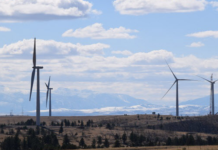Mass Audubon's final position statement on the Cape Wind Energy Project is a summarization of key elements of almost a decade of analyses, public testimony and reporting on Cape Wind by the organization.
Cape Wind and permitting agencies have fulfilled Mass Audubon's challenge to fill key avian data gaps, as well as perform robust mitigation and monitoring and create a high standard by which all other offshore wind farms in the U.S. would be measured.
Mass Audubon's support is based on nine years of analyses of field data collected by Cape Wind and independent field work by Audubon's staff; review of state, federal and regional environmental impact documents, including the U.S. Fish and Wildlife Service's (FWS) biological opinion; independent scientific literature research; and consultation with ornithologists, scientists and engineers, as well as state and federal agencies, including the U.S. Department of the Interior's (DOI) Minerals Management Service (MMS), the U.S. Army Corps of Engineers (ACOE) and the FWS.
Mass Audubon held meetings with organizations and individuals that both support and oppose the project. The organization also conducted a field visit to Denmark's offshore wind farms at Horns Rev and Nysted during the 2005 spring bird migration season in order to conduct its own observational research.
Mass Audubon will continue to analyze and report on Cape Wind through MMS' Outer Continental Shelf lease arrangement; ACOE Section 10 permit issued under the U.S., Rivers and Harbors Act; the Environmental Management Service's adaptive management plan; and avian monitoring and mitigation plan implementation during the construction and three-year post-construction phases of the project.
However, a coalition of groups filed suit against federal agencies responsible for approving the proposed Cape Wind farm on the grounds that the project will exact a toll on federally protected migratory birds. The suit contends that required scientific studies were not done and that mandated protective measures were ignored in approving the 130-turbine project.
The lawsuit filed today in federal district court in Washington, D.C.,contends that the MMS and the FWS violated the Endangered Species Act, Migratory Bird TreatyAct and the National Environmental Policy Act in green-lighting the offshore wind farm.
Plaintiffs include Public Employees for Environmental Responsibility, Cetacean Society International, Lower Laguna Madre Foundation, Californians for Renewable Energy, Three Bays Preservation and the Alliance to Protect Nantucket Sound. They are represented by Meyer Glitzenstein & Crystal.
SOURCES: Mass Audubon, Alliance to Protect Nantucket Sound



